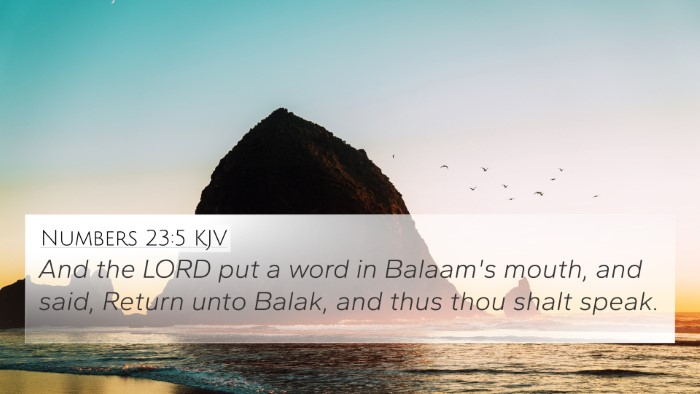Understanding Numbers 23:16
Numbers 23:16 states: "And the LORD met Balaam, and put a word in his mouth, and said, Go again unto Balak, and say thus." This verse emphasizes God's sovereignty and His role as the communicator of His will to people, particularly highlighted in the context of Balaam's interactions with Balak. Below we delve into the meaning and implications of this scripture.
Insights from Bible Commentaries:
- Matthew Henry: Balaam was approached by Balak with the intention of cursing Israel. However, this verse indicates that God intervened directly, showing His authority over prophets and their messages. It highlights that God can control even those who may not follow Him, using them for His purposes.
- Albert Barnes: Barnes notes the significance of God’s communication as an intimate and direct action towards Balaam. The phrase indicates that God provided Balaam with specific words, implying that the content delivered was not for Balaam’s interpretation but strictly God’s directive. This emphasizes God's control over prophecy.
- Adam Clarke: Clarke elaborates on how this incident illustrates God’s providence and power. By putting His words in Balaam’s mouth, God ensures truth prevails in a situation intended for harm. Clarke also comments on the symbolic nature of Balaam being a false prophet whose role is overridden by the true voice of God.
Theological Implications:
This verse indicates the overarching theme of divine sovereignty. God can choose to reveal His will through anyone, regardless of their personal stance towards Him. It serves as a reminder that God's purpose will be accomplished, despite human intentions.
Cross-References:
- Numbers 22:12: "And God said unto Balaam, Thou shalt not go with them; thou shalt not curse the people: for they are blessed."
- 1 Samuel 16:1: "And the LORD said unto Samuel, How long wilt thou mourn for Saul, seeing I have rejected him from reigning over Israel? fill thy horn with oil, and go, I will send thee to Jesse the Bethlehemite: for I have provided me a king among his sons."
- Jeremiah 1:9: "Then the LORD put forth his hand, and touched my mouth. And the LORD said unto me, Behold, I have put my words in thy mouth."
- Ezekiel 3:4: "And he said unto me, Son of man, go, get thee unto the house of Israel, and speak with my words unto them."
- Zech 1:16: "Therefore thus saith the LORD; I am returned to Jerusalem with mercies: my house shall be built in it, saith the LORD of hosts."
- Proverbs 21:1: "The king's heart is in the hand of the LORD, as the rivers of water: he turneth it whithersoever he will."
- Isaiah 45:1: "Thus saith the LORD to his anointed, to Cyrus, whose right hand I have holden, to subdue nations before him."
Connections Between Bible Verses:
The connections between these verses illustrate the theme of divine guidance and the communication of God's will to His chosen vessels. When God invests His words into a person, it inherently underscores the importance of obedience to that divine calling. Each of these supporting verses reinforces that God actively directs human affairs, shaping the course of history according to His will.
Conclusion:
In conclusion, Numbers 23:16 serves as a poignant reminder of God's sovereignty and His ability to communicate His will to humanity, even through unexpected individuals. Engaging with this verse encourages deeper contemplation on how God operates in our lives and the world around us. Each cross-reference not only sheds light on the verse itself but also builds a robust understanding of God's domain in biblical narratives.
Further Study Suggestions:
- Engage with tools for Bible cross-referencing to uncover more connections between scripture.
- Explore the use of a Bible concordance to identify thematic links and parallels.
- Consider how the principles seen in Numbers 23:16 can apply in contemporary contexts.
- Conduct a cross-reference Bible study focusing on the lives of prophets and their divine commissions.





